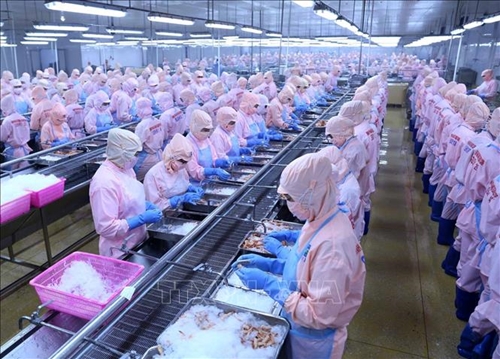According to the ministry, the US Customs and Border Protection (CBP) on February 11 issued a decision, saying that there was no evidence to conclude that the Minh Phu company evades anti-dumping taxes that the US has imposed on shrimp imports from India.
    |
 |
|
Minh Phu company's shrimp processing |
The CBP then cancelled the decision it issued on October 13, 2020 on the imposition of anti-dumping tariffs on the Minh Phu company’s frozen shrimp products exported to the US.
The MoIT applauds the conclusion and believes that this is a decision that fully considers information and efforts of the Minh Phu company and related parties in the process of handling the case, helping to create fair competition between US shrimp producers and foreign exporters.
The ministry said since the CBP initiated the investigation, it has worked with the Ministry of Agriculture and Rural Development, the Vietnam Association of Seafood Exporters and Producers (VASEP) and the Minh Phu company to clarify the case.
The Minh Phu company was requested to coordinate with and provide maximum information for the US side.
The MoIT suggested the US side conduct an objective and transparent investigation to ensure the interests of genuine enterprises.
In the time to come, the ministry will continue to discuss with relevant US agencies to clarify information, thus ensuring legitimate rights and interests of Vietnam's shrimp farming, processing and exporting industry.
It also recommended domestic enterprises to study, develop and implement an origin traceability mechanism to satisfy requirements of import countries.
On January 14, 2020, the CBP announced the initiation of an investigation into anti-dumping tax evasion that is currently applied to Indian shrimp imports.
The CBP had applied the Enforce and Protect Act (EAPA) to conclude that frozen shrimp products exported by Minh Phu to the US should be subject to duties in accordance with the anti-dumping order imposed on shrimp from India. It said the company did not provide sufficient evidence as requested by the CBP to prove that it was not using shrimp originating from India for export to the US.
The Minh Phu company decided to send an administrative complaint to the CBP’s senior agency, because the decision ignored key evidence that it had an effective traceability system and was not using raw shrimp from India for exports to the US.
In fact, Minh Phu clearly demonstrated its separation and traceability method approved by the National Oceanic and Atmospheric Administration (NOAA) under the US Department of Commerce, based on its requirements for the Seafood Import Monitoring Programme.
Source: VNA